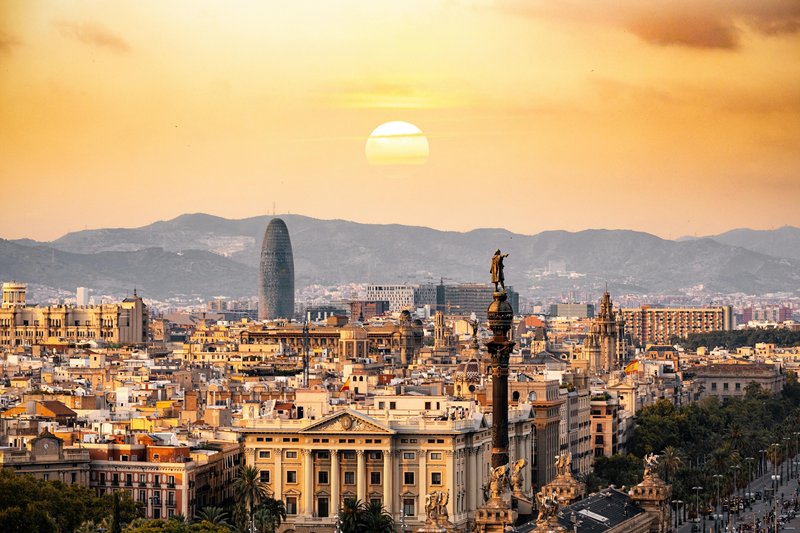Introduction
Olá! Welcome to Portugal, where the sun actually shines, the wine costs less than water, and you can get residency without selling your firstborn. If you're reading this, you've probably already fallen down the Portugal rabbit hole – maybe you saw those Instagram photos of colorful Porto houses, or someone told you about the whole "Golden Visa" thing.
I've been living here for three years now, and I can tell you that Portugal is having a serious moment. Everyone and their mother seems to be moving here, from Silicon Valley tech bros to British retirees to digital nomads who discovered they can work from a beach town for a fraction of their San Francisco rent.
But here's what the Instagram posts don't show you: the bureaucracy that makes Italian red tape look efficient, the housing market that's gone absolutely bonkers, and the fact that learning Portuguese is like trying to solve a puzzle where half the letters are silent. The good news? Even with all that, Portugal still manages to be one of the most livable, affordable, and genuinely pleasant places in Europe. Just don't expect it to be easy.

Visa Programs
Portugal offers several visa options for expats looking to relocate, each catering to different circumstances and needs:
Digital Nomad Visa (D8 Visa)
- Eligibility: Remote workers and digital professionals
- Income Requirement: Minimum €3,040 per month (approximately)
- Validity: 2 years, renewable
- Benefits: Legal residence, freedom to travel in Schengen Area
- Pathway: Can lead to permanent residency and eventually citizenship
Golden Visa
- Eligibility: Investment-based residence permit
- Options:
- Real estate investment (with restrictions on location)
- Capital transfer (€500,000 minimum)
- Job creation (minimum 10 jobs)
- Research or artistic production (€250,000)
- Physical Presence: Only 7 days per year required
- Citizenship: Eligible after 5 years
D7 Visa (Passive Income Visa)
- Eligibility: Retirees, pension recipients, or those with stable passive income
- Income Requirement: Minimum Portuguese minimum wage (approximately €760 per month)
- Validity: 2 years, renewable
- Benefits: Popular among retirees and remote workers
EU Blue Card
- Eligibility: Highly qualified professionals with job offers in Portugal
- Requirement: Higher education qualification and employment contract
- Salary: Minimum 1.5 times the average gross annual salary in Portugal
- Benefit: Easier access to the EU labor market
Important: Visa requirements change frequently. Always check the latest information from the Portuguese Consulate or Immigration Office (SEF) before applying.
Premium Portugal D7 Visa Checklist
Planning to apply for a Portugal D7 visa? Our comprehensive checklist makes the process simple:
- Complete step-by-step application guide
- All required documents listed with examples
- Updated 2025 financial requirements
- Expert tips for faster approval
Here's what they don't tell you: show them 12+ months of consistent income history and a Portuguese bank account with enough funds to cover 6-12 months of living expenses.

Cost of Living
Portugal offers an attractive cost of living, especially when compared to other Western European countries. However, expenses can vary significantly depending on the region and lifestyle choices.
Monthly Living Expenses (Approximate)
| Expense Category | Lisbon | Porto | Algarve | Madeira |
|---|---|---|---|---|
| One-bedroom apartment (city center) | €800-€1,000 | €650-€850 | €600-€900 | €550-€750 |
| One-bedroom apartment (outside center) | €600-€800 | €450-€650 | €500-€700 | €400-€600 |
| Utilities (electricity, heating, water) | €80-€120 | €70-€110 | €80-€120 | €70-€100 |
| Internet (60 Mbps) | €25-€40 | €25-€40 | €25-€40 | €25-€40 |
| Groceries (basic monthly items) | €200-€300 | €180-€280 | €200-€300 | €190-€290 |
| Public transport (monthly pass) | €40 | €30-€40 | €30-€50 | €30-€40 |
| Dining out (mid-range restaurant, meal for two) | €40-€60 | €35-€50 | €40-€60 | €35-€50 |
| Total (approximate monthly) | €1,500-€2,200 | €1,200-€1,800 | €1,300-€1,900 | €1,100-€1,700 |
Budget Tip: Consider living in smaller cities or towns outside the major tourist areas for significant cost savings on rent and daily expenses.
Pro Tip: While Lisbon and Porto offer vibrant expat communities, consider smaller cities like Coimbra, Braga, or coastal towns in the Algarve for significantly lower housing costs (30-50% less) while maintaining high quality of life. Many expats find that moving just 30 minutes outside major cities can cut their housing costs in half while providing a more authentic Portuguese experience.

Tax Benefits
Portugal offers attractive tax incentives for new residents, making it a popular destination for expats and digital nomads seeking tax efficiency.
Non-Habitual Resident (NHR) Program
The NHR program is a special tax regime that offers significant tax advantages to eligible new residents for a period of 10 years:
- Eligibility: New tax residents who haven't been tax residents in Portugal in the previous 5 years
- Benefits:
- 20% flat tax rate on Portuguese-sourced income from high value-added activities (specific professions)
- Potential tax exemption on certain foreign-sourced income (pensions now taxed at 10%)
- No wealth tax
- Application: Must be submitted before March 31 of the year following becoming a tax resident
Important Update: Recent changes to the NHR program have modified some benefits, particularly for pension income. Consult with a tax professional for the most current rules.
Pro Tip: If you qualify for Portugal's Non-Habitual Resident (NHR) tax status, apply immediately after establishing tax residency. The 10-year benefit period begins from approval, not application. For digital professionals, review Portugal's list of "high-value activities" that qualify for the reduced 20% income tax rate. Having your job title and description match one of these categories can significantly reduce your tax burden for a decade.
Regular Portuguese Tax Rates
If you don't qualify for NHR status, you'll be subject to standard Portuguese taxation:
- Personal Income Tax: Progressive rates from 14.5% to 48% (for income above €75,009)
- Social Security Contributions: 11% for employees (23.75% for employers)
- Capital Gains Tax: 28% (with some exceptions)
- Dividend Tax: 28% (potential reductions under tax treaties)

Job Market and Salaries
Portugal's job market for expats offers diverse opportunities, though salaries are generally lower than in Northern European countries. The growing tech scene and robust tourism industry provide interesting options for international professionals.
Popular Job Sectors for Expats
- Tourism and Hospitality: Hotels, restaurants, tour operations
- IT and Technology: Growing tech hubs in Lisbon and Porto
- Remote Work: Digital nomads working for international companies
- Language Teaching: English and other foreign languages
- Renewable Energy: Expanding sector with international projects
- Customer Support: Multilingual call centers and support roles
Average Annual Salaries (Gross)
| Position | Salary Range (€) |
|---|---|
| Software Developer | €30,000 - €50,000 |
| English Teacher | €15,000 - €25,000 |
| Tourism Professional | €18,000 - €30,000 |
| Marketing Specialist | €25,000 - €40,000 |
| Customer Support (Multilingual) | €18,000 - €28,000 |
| Project Manager | €35,000 - €55,000 |
Job Search Resources:
- LinkedIn Portugal
- Net Empregos
- Indeed Portugal
- Expatica Jobs
- Landing.jobs (Tech focused)
Salary Reality Check: Portuguese salaries will make you weep if you're coming from Silicon Valley or London. We're talking 30-50% less than what you're probably used to. The good news? Companies like Cloudflare, Uber, Google, and Microsoft have set up shop here and actually pay something closer to real money.
Your best bet is to either work remotely for a foreign company (keep that US/UK salary while living here) or target international companies in hot sectors like fintech or renewable energy. Local companies... well, let's just say the work-life balance better be worth it to you.

Culture and Lifestyle
Portuguese culture offers a delightful blend of traditional values and modern European sensibilities. Understanding and embracing the local way of life will greatly enhance your expat experience.
Portuguese Cultural Characteristics
- Relaxed Pace: The Portuguese value a less hurried approach to life, with emphasis on enjoying simple pleasures
- Family Values: Family bonds are strong, with frequent gatherings and celebrations
- Café Culture: Social life often revolves around cafés and long, leisurely meals
- Saudade: A uniquely Portuguese concept of nostalgic longing
- Fado Music: Emotive traditional music that embodies Portuguese soul
- Cultural Heritage: Deep pride in Portugal's history, discoveries, and traditions

Daily Schedule: Portuguese mealtimes tend to be later than in many countries. Lunch is typically from 1:00-3:00 PM, and dinner from 8:00-10:00 PM. Many businesses close for a few hours in the afternoon.
Social Survival Guide: Here's something that'll mess with your head if you're from Germany or Switzerland – being on time in Portugal is actually considered rude. Show up 15-30 minutes late to dinner parties, or you'll be standing awkwardly in someone's kitchen while they're still cooking.
Always bring wine or pastéis (pastries) when invited to someone's home. And here's a secret: even if your Portuguese sounds like a drunk toddler, attempt it anyway before switching to English. Portuguese people will literally light up when you try to speak their language, even if you butcher it completely. It's like a magic key that opens doors everywhere.
Healthcare System
Portugal offers universal healthcare through its Serviço Nacional de Saúde (SNS), ranked among the better healthcare systems in Europe. Expats with legal residency can access this public system.
Healthcare Options
- Public Healthcare (SNS):
- Available to legal residents
- Mostly free or low-cost services
- May involve waiting times for non-emergency services
- Quality varies by region
- Private Healthcare:
- Shorter waiting times
- More likely to have English-speaking staff
- Private health insurance recommended (€40-€100 monthly)
- Well-developed network in major cities
Registration Process: To access the SNS, register at your local health center (Centro de Saúde) with your residence permit, tax number (NIF), and social security number.
Healthcare Hack: Portugal's public healthcare is decent, but unless you enjoy waiting three months to see a specialist, get private insurance (€50-100/month). It's worth it just for the English-speaking doctors who won't look at you like you're speaking Martian when you try to explain your symptoms.
Money-saving tip: always ask for "medicamentos genéricos" (generic drugs) at the pharmacy. Same stuff, 30-70% cheaper. And the electronic prescription system is actually brilliant – your doctor sends prescriptions straight to your phone. No more losing that tiny piece of paper five minutes after leaving the clinic.

Regional Highlights
Portugal offers diverse environments for expats, from bustling cities to tranquil coastal towns. Each region has its unique charm, lifestyle, and cost considerations.
Lisbon and Surroundings
- Atmosphere: Vibrant capital with historic charm and modern amenities
- Best For: Career opportunities, startup scene, cultural activities
- Cost Level: Highest in Portugal, especially for housing
- Highlights:
- Thriving tech and startup ecosystem
- Rich cultural offerings and nightlife
- Historic neighborhoods like Alfama and Bairro Alto
- Easy access to beaches (Cascais, Costa da Caparica)
- Day trips to Sintra's fairytale palaces

Porto and Northern Portugal
- Atmosphere: Historic, authentic, slightly more traditional
- Best For: Lower cost of living, rich cultural experience, less touristy feel
- Cost Level: Moderate, more affordable than Lisbon
- Highlights:
- UNESCO World Heritage historic center
- Port wine cellars and wine tourism
- Douro Valley wine region nearby
- Growing tech scene
- Authentic Portuguese lifestyle
Algarve
- Atmosphere: Relaxed coastal living with international community
- Best For: Retirees, beach lovers, digital nomads
- Cost Level: Varies seasonally, tourist areas more expensive
- Highlights:
- Over 300 days of sunshine per year
- Stunning beaches and dramatic cliffs
- Large expat community, especially British
- World-class golf courses
- Outdoor activities year-round

Madeira and Azores
- Atmosphere: Island living with natural beauty and mild climate
- Best For: Nature lovers, outdoor enthusiasts, peaceful lifestyle
- Cost Level: Generally lower than mainland cities
- Highlights:
- Breathtaking landscapes and hiking trails
- Madeira's growing digital nomad scene (Digital Nomad Village in Ponta do Sol)
- Year-round mild climate
- Slower pace of life
- Unique cultural traditions
Tips for New Expats
Moving to a new country is always challenging. Here are some practical tips to help you settle smoothly into Portuguese life.
Language
- Learn Basic Portuguese: While many Portuguese speak English, especially in tourist areas and larger cities, learning basic Portuguese phrases will enrich your experience
- Language Resources:
- Apps: Duolingo, Babbel, Memrise
- Local language schools offer intensive courses
- Language exchange meetups in major cities
- Regional Differences: Portuguese spoken in Portugal differs from Brazilian Portuguese in accent, vocabulary, and some grammar
Banking and Finance
- Opening a Bank Account: Requires NIF (tax number), passport, proof of address, and sometimes proof of income
- Recommended Banks:
- Millennium BCP
- Novo Banco
- Santander
- Activobank (digital-focused)
- NIF (Número de Identificação Fiscal): Essential tax number needed for almost everything in Portugal
Getting Your NIF: You can obtain a NIF at any Finanças (tax office) or through a fiscal representative if you're not yet a resident. This number is essential for almost all financial and legal transactions in Portugal.
Housing
- Rental Market: Competitive in major cities, especially Lisbon
- Rental Contracts: Typically 12 months, requiring 1-2 months security deposit
- Popular Websites:
- Idealista
- Imovirtual
- Facebook groups for expats
- Short-term Options: Airbnb or coliving spaces while searching for permanent housing
Social Integration
- Expat Communities: Active in all major Portuguese cities
- Meetup Groups: Meetup.com has numerous groups for various interests
- Facebook Groups: "Expats in Lisbon", "Expats in Porto", "Americans in Portugal", etc.
- Local Events: Participate in festivals, markets, and community events

The Real Deal
Here's the truth about Portugal: it's going to frustrate you with bureaucracy that makes no sense, charm you with people who invite you to family dinners, and completely spoil you with wine that costs less than a Starbucks coffee. You'll spend hours waiting in government offices, then find yourself on a beach at sunset wondering why you ever lived anywhere else.
The housing market is insane, the salaries are low, and good luck getting anything done quickly. But then you'll realize you're taking two-hour lunch breaks, your stress levels have plummeted, and you've somehow become the type of person who knows their neighbors' names. Portugal has this sneaky way of making you slow down and actually enjoy life.
Fair warning: Portugal is addictive. You'll start planning your entire life around staying here, and "just visiting for a year" will turn into "well, maybe I'll get permanent residency." Don't say I didn't warn you when you find yourself googling Portuguese real estate at 2 AM.
Final Truth: Learn the word "devagar" (slowly) – it's not just a word here, it's a way of life. Fight it at first, then embrace it completely. You'll thank me later when you're sipping wine at 3 PM on a Tuesday and realizing this is actually how life should be lived.
Disclaimer: All prices and information in this article are approximate and subject to change. This guide was last updated in May 2025. Always verify current information from official sources before making any decisions. This article contains general information only and is not intended as legal, financial, or relocation advice.


